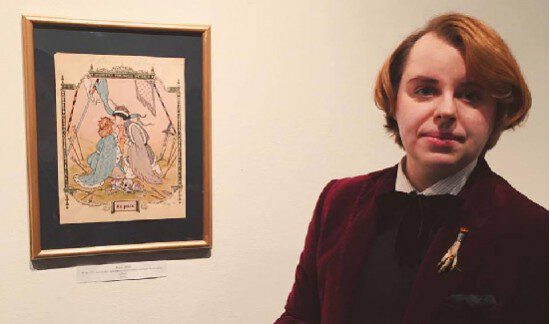Joe Corallo: Fyodor Pavlov, Artist Extraordinary
Last Thursday, Fyodor Pavlov, a person I’m honored to call a friend, had the opening reception for his exhibition at the Leslie-Lohman Museum of Gay and Lesbian Art.Titled Carpe Noctem: Eros to Thanatos, the exhibition celebrates the interlocking themes of queer desire, sex, myth and death. The opening reception featured not only wine and cheese, but music and burlesque performances. It was an evening of celebrating queer art in many forms, and something that the comic book industry should be aware of.
Fyodor is a queer artist, a Russian immigrant, and a New Yorker. His art has been commissioned both privately and commercially. Additionally, he works on comics including Baritarian Boy co-created with his partner Lawrence Gullo and Bash Back, his current web comic co-created both his partner and with writer Kelsey Hercs.
Bash Back is a queer mafia story. Here’s the quick pitch as taken from their page, “Thousands of of years of bloodshed, torment and ridicule. Now it is time to take what is ours. Retribution.” Sounds pretty tense, doesn’t it? Bash Back is a uniquely queer creation delving into a queer power fantasy; a subgenre that is scarcely seen or heard of in just about every entertainment medium, particularly as well thought out and diverse as this story. Their work on Bash Back speaks much better than I ever could on it, so please check it out here.
Lawrence and Fyodor, in addition to both being accomplished artists, produce and direct Dr. Sketchy’s for New York, the flagship of the Dr. Sketchy’s empire.
I could continue going about Fyodor’s many impressive artistic accomplishments, but it might be easier if you just check out his website here. The point is, the LGBTQ community has incredibly talented people in it like Fyodor Pavlov, and the comic industry should be aware of him and others like him, because they need him.
Mainstream comics have become more or less stale. The same stories happening to the same characters in an endless loop that recycles itself faster and faster. I own or have read more #1 issues of comics from the big two currently than I ever thought I would have when I was in grade school. Part of solving this problem is diversity. Just having people with different life experiences and points of views to tap into alone can help make fresh and new stories for a general audience.
Even beyond the mainstream, many of the smaller publishers get stuck telling similar stories as well. Over at Image, the incredible success of Saga has opened the floodgates for science fiction driven stories – over there. Some of the other smaller publishers putting out more autobiographical books still put out a great deal of graphic memoirs from predominantly straight white men coming of age. Not that they aren’t great reads, like Jeffrey Brown’s Clumsy, but we are still lacking in terms of LGBTQ stories.
Yes, we do get some. The big two have a couple of books with LGBTQ leads, smaller publishers seem to have more representation, but not a great deal more. Certainly not when it comes to characters leading books and pushing plots forward, and certainly not to the extent of that Fyodor, Lawrence, and Kelsey have gone in Bash Back. Comic companies need to be keeping an eye out for people like them for their very livelihoods. To stay relevant in a rapidly changing age.
One company that might be trying this is Aftershock Comics. A new publisher that already has some grade A talent attached, they released a comic last week by Marguerite Bennett titled Insexts. It’s a Victorian era lesbian body horror tale. I can’t imagine a major publisher taking a risk on this, or thinking that there is even much of an audience for this. However, from seeing the kind of stories that people like Fyodor put out and make available online, and the positive reactions they receive, I can say that it is very likely that this is exactly the kind of story that can sell right now. Fellow ComicMix columnist Molly Jackson feels this could be the book that blows up for Aftershock and helps to make them a major player in the field.
The comic industry is changing. The audiences are changing. The demands are changing. If the industry is as smart as I hope it is, they’ll see incredibly talented artists like Fyodor and try to snatch them up and help them navigate this brave new world. Not because these artists need the comic industry, but because the industry has never needed them to tell their stories more.












